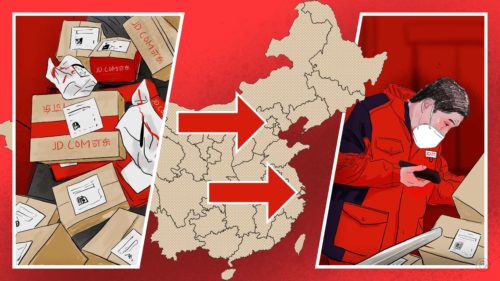Coping with COVID-19 anxiety
“We tend to think of the Chinese internet as a battleground — activists and censors locked in an endless conflict. But, to many, it is also homey and comforting, parts of it as familiar as a cozy kitchen.”
At no time has this been more true than now, Krish Raghav writes (and beautifully illustrates) in the New Yorker, as over half of China’s population has been under some form of travel restriction over the course of the COVID-19 outbreak. “Quarantine cooking” has become its own genre of online content, Raghav says.
Millennial Chinese have been using cooking websites like Xiachufang (下厨房 xià chúfáng; “go to the kitchen”), livestreaming websites like Bilibili, and social media networks like Weibo to find new ways of connection and camaraderie as they experienced lockdowns — and found themselves forced to cook at home, rather than just ordering takeout every night.
On a more serious note, Bloomberg has a story by Adam Minter on the possible mental health consequences for healthcare workers and patients affected by COVID-19 quarantines:
During SARS, thousands of patients globally — including in China — were ordered into quarantines. In Toronto, one of the most severe hotspots, researchers surveyed 129 individuals who were quarantined, shortly after their isolation ended. Post-traumatic stress was identified in 28.9% of patients, and depression was found in 31.9%…
…a failure to monitor and treat mental health in medical professionals and patients can serve to undermine a successful quarantine. Mentally distressed patients are more likely to disobey containment orders — or outright flee. There also concerns that distressed and depressed patients may be less willing or able to reveal recent personal contacts necessary to trace, and halt, an epidemic. And, especially in China, there are fears that distressed patients may attack medical professionals.
More COVID-19 updates for today:
It was officially “the worst week for Wall Street since the financial crisis,” CNBC reports, with the Dow Jones Industrial Average down 12% for the week, the S&P 500 down 11.5%, and Nasdaq down 10.5%.
The economic impact on China will last into the second quarter, said Yale economist Stephen Roach (who tends to be bullish on China), per CNBC. “My baseline view…is that this will last longer than the SARS-related disruption, which was one quarter.”
- Supporting this view: In an “online survey conducted by Rong360.com, a Beijing-based firm providing financial and credit information and products, 31.4 percent of respondents said they would not increase consumer spending” once the outbreak subsides, the SCMP reports.
- Martin Brudermueller, the chief executive officer of German chemicals giant BASF, also said that COVID-19 “will take its toll into the second quarter,” per Bloomberg.
One positive signal: “The number of searches for flights” on the website of travel agency Tongcheng-Elong Holdings is increasing. “Searches for bookings during the April 4-6 Tomb Sweeping Holiday, or Qing Ming Festival, jumped 138% on Feb. 23 from a week earlier, while those for flights in the Labor Day break from May 1 to 5 increased 84%,” the company said, per Bloomberg.
—Lucas Niewenhuis






